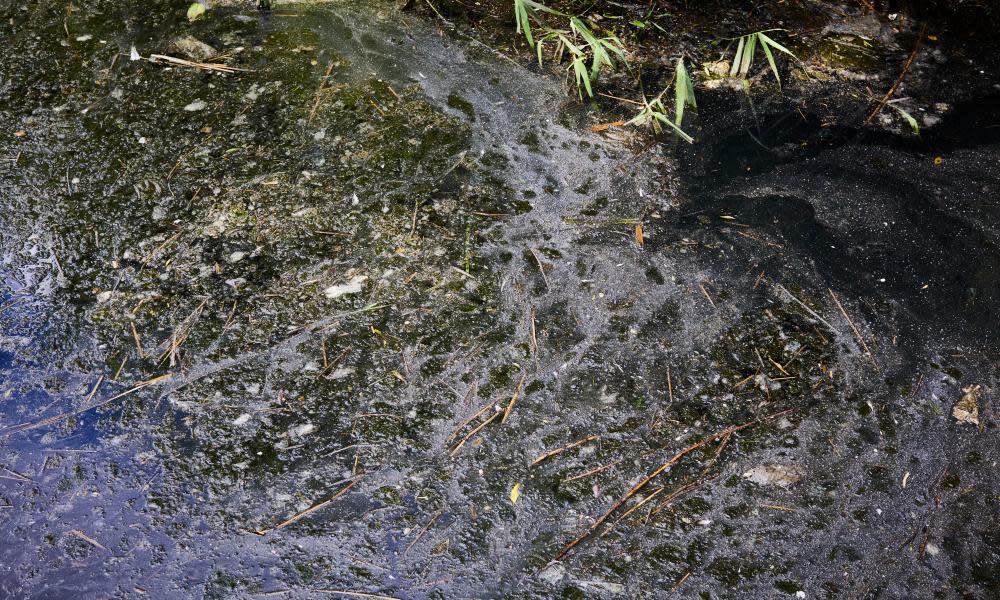Environment Agency knew sewage was being dumped into rivers years ago, leak reveals

The Environment Agency knew raw sewage was being illegally dumped into English rivers from wastewater treatment works a decade ago, a leaked report shows.
However, the agency’s chief executive told MPs in May that the practice had only recently come to light.
The Environment Agency’s 2012 inspection report for the north-west region shows that a number of sewage works belonging to the water company United Utilities were dumping raw sewage into rivers while failing to treat the required amount of sewage stipulated in their permits.
Water companies are allowed to discharge untreated sewage into rivers, lakes and seas only at times of exceptional rainfall and only then if they are already treating a specified volume of sewage, known as “flow to full treatment” (FtFT).
The report shows that United Utilities was fined £200,000 for FtFT-related breaches at its Cleator sewage works in Cumbria, where flow data showed that only 65% of the required sewage was being treated while raw sewage was being dumped into the nearby river, and that “the storm overflow weir had been set deliberately to this lower level”.
It also shows Environment Agency officers suspected a further 35 United Utilities works to be dumping sewage while failing to treat the required amount of sewage. Officers carried out inspections at nine sites and found issues with FtFT at five works as a result of problems with flow meters and an Archimedes screw, along with “erratic readings” and “gaps in flow data”.
Although the report was written in 2012, the Environment Agency chief executive, Sir James Bevan, told the House of Commons environment, food and rural affairs committee in May this year, that “until recently, we have not had very good data about what is happening at sewage treatment works”.
Two investigations into the practice are under way. In November, the Department for Environment, Food and Rural Affairs announced that “several water companies had come forward” to say that “many of their sewage treatment works may not be compliant”, and that the Environment Agency and Ofwat had both launched sector-wide investigations into sewage dumping.
Defra’s announcement came shortly after campaigners from Windrush Against Sewage Pollution (Wasp) published its analysis of water company data that showed many works were dumping raw sewage in dry conditions and without treating enough sewage.
But Bevan told MPs on the committee that it was the Environment Agency’s insistence that water companies put monitors on their sewage treatment works that prompted water companies to come forward and tell the agency that the data would reveal non-compliance.
“And it was that understanding, which only came to us, frankly, within the last 12 months, that led to the investigation that the Environment Agency is running … that appears to show significant and widespread breaches of … permits,” Bevan told the MPs.
A whistleblower from the Environment Agency said the report “highlights how common” the practice is.
“This was known in 2012 when self-regulation was pushed and water quality monitoring, staffing and regulation was dramatically cut,” they added. “The agency had an opportunity to prevent over 10 years of illegal sewage dumping but chose not to take it, despite the funding being available. They knowingly permitted the illegal activity to continue.”
An Environment Agency spokesperson said the agency has “significantly driven up monitoring and transparency from water companies in recent years. In 2016, there were only 800 event duration monitors on storm overflows, and now there are more than 12,000. This data is allowing us to hold the industry to account on a scale never seen before”.
But event duration monitoring data has not been reliable. The government’s recently published plan to reduce sewage spills “relies on self-reporting of sewage spills by the water industry”, said Prof Peter Hammond, formerly visiting scientist at the UK Centre for Ecology and Hydrology. But “close scrutiny of submissions to the Environment Agency suggests water companies cannot be trusted to provide complete and correct spill data”, he said.
“The plan will fail unless the Environment Agency takes back control of all monitoring and dramatically improves its regulation,” he added.
An Environment Agency spokesperson said it has recently requested detailed data from more than 2,200 wastewater treatment works “as part of the biggest investigation we have ever undertaken into potential permit breaches – and where there is evidence of non-compliance we will not hesitate to pursue the water companies concerned and take appropriate action”.
“We continue to take tens of thousands of water quality samples ourselves every year as part of our work to keep rivers clean, and we are also investing more this year to further advance our approach to sampling – and we have placed a wide range of new requirements on water companies to significantly increase their monitoring and reporting so that this data is available to all.”
The spokesperson declined to comment on the time gap between the date of the leaked report and Bevan’s comments.
A United Utilities spokesperson said: “These would be serious allegations and we will need to investigate further.”
Ash Smith, the founder of Wasp, said the water industry had “based its business success on ‘sweating the assets’ – not upgrading sewage works and dumping the sewage that it can’t treat into our rivers and seas, largely without interference from the Environment Agency.
“The industry has become reliant on this often illegal activity to make profits and bonuses and to do this it needed the agency to let most of it go unpunished and unchecked.”
Water companies told the Environment Agency that they dumped raw sewage into rivers and seas 372,544 times last year, for 2.6m hours. The real figure is believed to be much higher though, due to underreporting.

 Yahoo Movies
Yahoo Movies 
